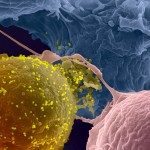Link to Pubmed [PMID] – 27288536
J. Immunol. 2016 Jul;197(2):517-32
It is widely assumed that CD4(+) T cells recognize antigenic peptides (epitopes) derived solely from incoming, exogenous, viral particles or proteins. However, alternative sources of MHC class II (MHC-II)-restricted Ags have been described, in particular epitopes derived from newly synthesized proteins (so-called endogenous). In this study, we show that HIV-infected dendritic cells (DC) present MHC-II-restricted endogenous viral Ags to HIV-specific (HS) CD4(+) T cells. This endogenous pathway functions independently of the exogenous route for HIV Ag presentation and offers a distinct possibility for the immune system to activate HS CD4(+) T cells. We examined the implication of autophagy, which plays a crucial role in endogenous viral Ag presentation and thymic selection of CD4(+) T cells, in HIV endogenous presentation. We show that infected DC do not use autophagy to process MHC-II-restricted HIV Ags. This is unlikely to correspond to a viral escape from autophagic degradation, as infecting DC with Nef- or Env-deficient HIV strains did not impact HS T cell activation. However, we demonstrate that, in DC, specific targeting of HIV Ags to autophagosomes using a microtubule-associated protein L chain 3 (LC3) fusion protein effectively enhances and broadens HS CD4(+) T cell responses, thus favoring an endogenous MHC-II-restricted presentation. In summary, in DC, multiple endogenous presentation pathways lead to the activation of HS CD4(+) T cell responses. These findings will help in designing novel strategies to activate HS CD4(+) T cells that are required for CTL activation/maintenance and B cell maturation.

